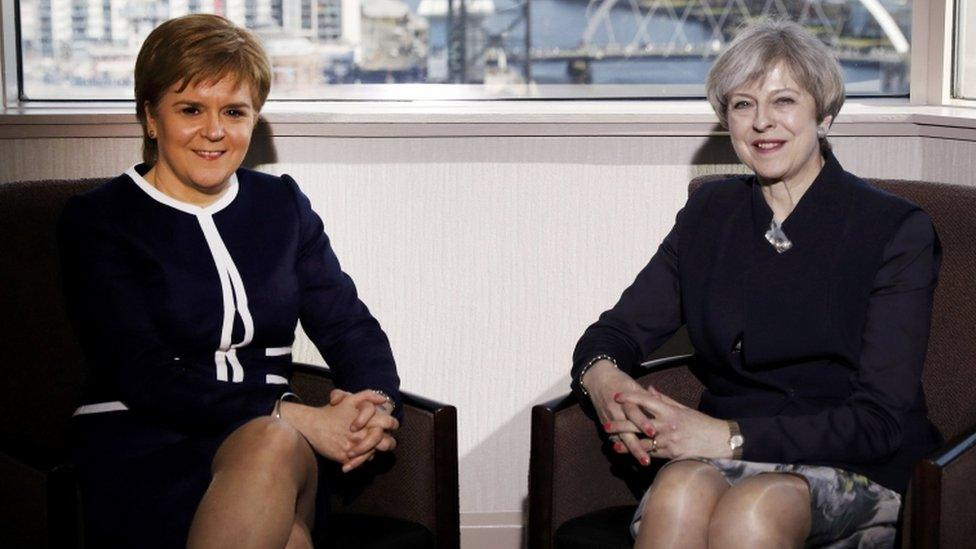May to have Brexit talks with Sturgeon
- Published
Theresa May set for Brexit talks with Nicola Sturgeon
Theresa May has said she will speak to Scotland's first minister in a bid to end the Brexit deadlock between the two governments.
The Scottish government has accused the UK government of using Brexit as an excuse for a "power grab" on the devolved parliaments.
And it has said it cannot back the prime minister's Brexit bill without changes being made.
Mrs May said she will have talks with Nicola Sturgeon on the issue.
In an interview with BBC Scotland ahead of the Conservative party conference, the prime minister said the UK government was already talking to the Scottish government "in a whole variety of ways" during the Brexit process.
Ministers from the two sides held "constructive" talks earlier this week, with further discussions due at the Joint Ministerial Committee next month.
It is not yet known whether Mrs May and Ms Sturgeon will attend the committee meeting - but BBC Scotland political correspondent David Porter said the prime minister seemed keen to try to end the log jam between the two governments.
'Best deal'
He asked the prime minister whether she would be willing to sit down with Ms Sturgeon to sort out their differences over the Brexit process.
Mrs May responded: "I will be talking to Nicola Sturgeon, as I'll be talking to (Welsh first minister) Carwyn Jones and I hope in due course obviously to a first minister and deputy first minister in Northern Ireland, about how we ensure that we get the best deal for the United Kingdom.
"That means yes, the best deal for Scotland, but that we ensure that the interests of people in Scotland are maintained by remaining part of the United Kingdom and part of the internal market of the UK."

Ms Sturgeon and Mrs May have met on a number of occasions since the Brexit vote
The Brexit bill will see powers in devolved areas, such as agriculture and fishing, that are currently controlled by Brussels returning to Westminster rather than to Holyrood once the UK leaves the EU.
It will be up to the UK government to decide which of these powers are then handed to the Scottish Parliament.
The Scottish and Welsh governments say this breaches the devolution settlement, and that the powers should automatically be devolved.
And despite Scottish Secretary David Mundell repeatedly pledging a "powers bonanza" for Holyrood after Brexit, the UK government has not yet given a firm commitment on what these new powers will be.
No further details
When asked to spell out to the Scottish people what additional powers would be passed to Holyrood, Mrs May would not give any further details.
Instead, she insisted only that "we expect a significant number of new powers will come down to Holyrood as a result of the Brexit decision and we will set those out in due course."
The prime minister also said: "Where it is right to devolve powers, where it makes sense to devolve powers, we will do that.
"But we want to make sure that we keep the internal market of the UK as well. That matters to Scotland, it matters to people in Scotland for their jobs."
The Scottish government's Brexit secretary, Michael Russell, said he was "always willing to talk" with his UK government counterparts over how best to move forward.
He added: "But the situation can be sorted very quickly - it doesn't need the prime minister to meet with the first minister.
"It needs an acknowledgement that the devolution settlement is important and that any changes to it would be negotiated and discussed.
"And if they can withdraw the parts of the bill that the Welsh and ourselves cannot agree to, then the solution is found."